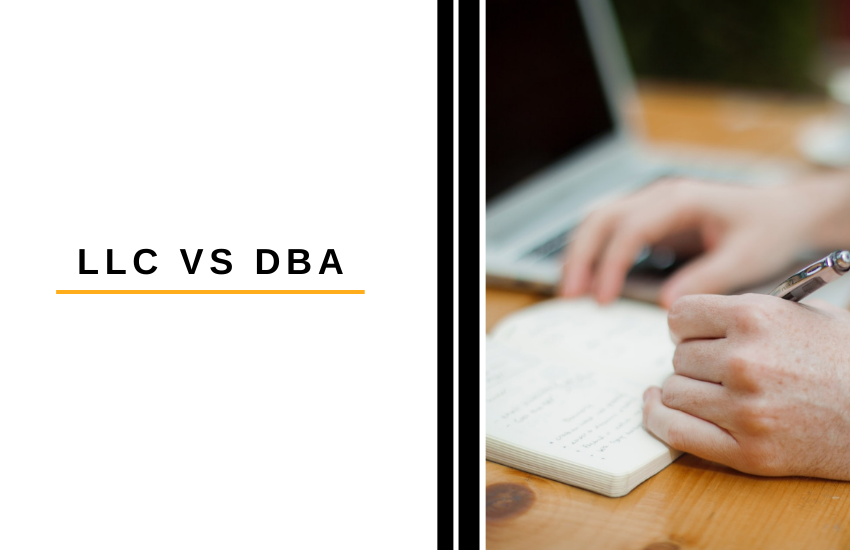- LLC vs DBA - The Main Differences
- Overview
- What Are the Advantages of a DBA?
- Disadvantages of a DBA
- Advantages of an LLC vs DBA
- Disadvantages of an LLC
- How To Register a DBA
- How to Form an LLC
- Frequently Asked Questions about LLC vs DBA
- LLC vs DBA Bottomline- Which is the Best Legal Structure for my Business?
Last Updated on December 5, 2023 by Ewen Finser
Are you looking to start a business? Congratulations on this bold step, and we hope you achieve all your goals. The first significant decision you have to make is the type of company you are going to form. Forget about all the products and services you anticipate to sell. We are talking about the kind of legal entity you are going to set up. You have a few options to choose from, and here, we will break down two notable ones; LLC vs DBA.

LLC vs DBA – The Main Differences
- An LLC is a limited liability company which is a fully recognized independent legal entity, whereas a DBA is a fictitious business name that a sole proprietor or partnership can use to brand their business.
- An LLC protects the members from the company’s liabilities, whereas a DBA offers no protections as it is just a business nickname
- An LLC is eligible for an EIN and gets taxed differently, whereas a DBA has no tax benefits and the owners are taxed on their individual returns
Read on;
Overview
Small business owners find it hard to pick between a Limited Liability Company and Doing Business As. This is because of the similarities these two entities hold and how their benefits overlap for small entities.
What is a DBA?
A company is said to be “Doing Business As” when their business operating name is different from its registered name. It mostly applies to sole proprietors and partnerships. When starting either of the two, you have to choose between a bespoke business name of DBA.
For example, Peter Myers opens a sole proprietorship under but does not wish to do business using his name. He hopes to trade under the name PM Agency. To do this, he has to file for a DBA.
Note that a DBA does not form a different legal entity. This way, PM Agency won’t be recognized as an independent entity from the owner. To gain this status, you need to run the business as a different legal entity. In simple terms, a DBA is a formal registration of a name you will use to run the business.
DBAs are not a big deal, and you can change them easily. This is because the name is just icing on the cake, but the core of the business still reflects the owner(s) name. The owner is not bound by limited liability, and business assets won’t be protected. If the company runs into losses, you will be expected to handle them.
The essence of a DBA is to allow small businesses to run like formal businesses without having to be an LLC. The company can open a bank account and receive payments under the DBA.
What is an LLC?
A Limited Liability Company is a business that runs as a different legal entity from its owners. The company should have managers and members. Members are the owners of the business, and the manager runs it. Managers can either be members or not.
Since LLCs are independent legal entities, owners have to go through multiple processes and meet more requirements to open one. The members have to conduct business under the LLC’s legal name. There is a process required to search for available names and reserve one before it is registered, depending on the state. This check is done to avoid picking an existing LLC name.
The essence of forming an LLC is protection for the company’s liabilities. Here, your assets won’t be liquidated if the company runs into losses as there is a clear distinction between the two.
To help you pick the best choice for your scenario, we will highlight the pros and cons of these two entities. Here, you will see which pros work for you and cons you cannot overlook before selecting a suitable legal structure for your new business.
What Are the Advantages of a DBA?
Flexibility
A DBA gives business owners a lot of flexibility to play around with their business name. This makes the business more receptive to changes in circumstances. For instance, opening a digital marketing agency under your name might not sound marketable enough if you are looking for new clients. Here, a DBA allows you to change the name to something more professional and get around that hurdle efficiently.
Good for Personal Privacy
For sole proprietorships and partnerships, DBAs help to cushion the owners to the publicity of having their names out there. As much as you are tied to your business, it gets to a point where you have to separate it from your personal life, and a DBA gives you this benefit. A DBA allows owners to file for a more professional name that reflects what the business does and protects them from having their names running in every business transaction.
Marketing Benefits
The flexibility to play around with your business name has a lot of marketing benefits. There is no limit to how many DBAs a company can register, and this comes in handy if you plan to operate in multiple niches. A DBA will help your business identify with all the individual niches using names that reflect what you are doing and not the owner’s one.
Limited Legal Requirements
While it is not a requirement in all states, most of them need it. Your business will be in deep trouble when you are apprehended operating under a name without opening a DBA. Since DBAs are common, setting up one is straightforward, and you can do it online. The legal requirements needed are minimal, and while they vary from state to state, you can have one within a few days.
Disadvantages of a DBA
Tax Limitations
A DBA allows you to operate under different names, but the core of the business remains intact. You are not permitted to use terms like LLC or Corporation under a DBA as the essentials of sole proprietorship and partnerships still apply. A DBA does not have any tax benefits associated with other types of businesses.
No Rights to the Name
Do not mistake a DBA for trademark. This is why there are few legal requirements to set up one. A trademark gives you exclusive rights to operate a business using a name. The process of obtaining one is lengthy and costs a lot of money. DBAs can only be used to a certain extent as they are not used in legal documents.
Zero Protection from Liability
A DBA gives your business a fictitious name, but you are not protected from any liability. If the company is a sole proprietorship, you will be forever tied to its liabilities regardless of how many DBAs you file. This is not an ideal situation since you never know when a business will run into losses.
State Restriction
All states have their requirements for filing for a DBA. This way, the flexibility of a DBA is limited in that it can only operate in the state you open it in. You might be required to file for different DBAs for every state you want to do business in. While multiple DBAs can have its benefits, it disintegrates your brand name, making it hard for customers to tie all the fictitious names together and connect them to your company.
Advantages of an LLC vs DBA
Pass-Through Taxation
The IRS views as income from the business as your income. This way, they tax this income as they would if you were working for any other company. Your business income is not subject to various federal taxes applied to members of a corporation.
Independence from the Company
As the name LLC implies, members have limited liability against the company. In simple terms, the LLC and its members are different entities. If the firm runs into losses, the personal assets of the members are protected and cannot be liquidated. The most you can lose is the capital you put into the business. These rules are not exclusive, and members can are liable for losses if they do not follow certain management principles and run the company into debt.
Freedom in Management
Unlike other legal structures, there are no restrictions on how to manage an LLC. They do not have to constitute a board of directors, annual meetings, or book requirements. Owners have the free will to structure the business as they wish, which allows them to focus more on the core business activities.
Disadvantages of an LLC
High Opening Costs
Unlike DBAs, opening an LLC involves more processes and money. Some states require yearly renewal fees, which can accumulate to large sums in the long run. These costs are justified by the complexity of an LLC’s structure compared to a DBA.
Strict Regulations
LLCs are independent entities, and the government has a host of regulations that dictate how they can be set up and operate. Due to the protection they receive, you cannot engage in certain business activities using an LLC. Examples are banks, insurance companies, and medical service companies. These regulations vary from state to state and ensure you check and see those that apply to you.
Regulations Mix-up
The laws that apply to LLC vary significantly across all the states, and it is hard to abide by all of them. This is because some of these laws contradict each other. If you open an LLC and plan to operate in different states, you might find it very hard to remain compliant. Note that it all depends on the states you want to operate in and how their laws are.
How To Register a DBA
- All states have their requirements for registering a DBA. Find out from the Secretary of State’s website to see what they need before you proceed.
- Pick a few names in your mind and check with the county records to see it does not exist.
- Fill the forms provided. Most states have them online where you can download and fill them.
- Once you fill the forms, file them with the relevant agency. You will be required to pay a fee for the service. The amount could be anything between $10 to $100. The DBA will be ready in under four weeks.
- Some states will ask you to publish the DBA with a local newspaper to create a public record.
How to Form an LLC
- Pick a state and read their regulations. If the business operates across multiple states, you will have to register a foreign LLC in all the other states other than your primary one.
- Give the LLC a name. Naming rules vary but will mostly require you to include the terms LLC.
- Find a registered agent. This is a company that sends and receives legal documents for your LLC. Notable registered agents include Legalzoom and Harbor Compliance. If the conditions permit, you can make your business its registered agent.
- Complete the application forms, namely, Articles of Organization, Certificate of Formation, or Certificate of Organization. You will file these forms with your secretary of state’s office. Today, most states let you complete this step online.
- Apply and receive a federal tax number. You will need it to open a bank account and hire workers. You can apply and receive one on the IRS website.
Frequently Asked Questions about LLC vs DBA
Is it better to have a DBA or LLC?
It all depends on your business goals. The main difference is that a DBA is a fictitious business name for a sole proprietorship or partnership, while an LLC is a full legal entity recognized by the law. An LLC gives you protection from the company’s liabilities but costs more and has more requirements to set up.
Does a DBA protect you?
A DBA does not cover you from the company’s liabilities. It only gives your business a different name you can use to transact and market it.
Does a DBA pay taxes?
A DBA is not a legal entity according to the law and thus does not pay taxes. The IRS taxes sole proprietors and partners through the individual tax returns of the owners. A DBA does not have a separate EIN.
Can someone take your DBA name?
It depends on the state. Some do not guarantee exclusive use of the name, and anyone can use it. A DBA is not the official business name, and there are no name searches done to ensure that no one is using one.
LLC vs DBA Bottomline- Which is the Best Legal Structure for my Business?
If you are looking to open a business, choosing between a DBA and LLC goes down to your plans and what activities you want the company to do. A DBA is a good option if you’re going to open a small company that won’t have to scale up in the future. It is a nickname of a sole proprietorship or a partnership, but the downside is you are tied to the liabilities. However, opening a DBA is easier, faster, and cheaper.

On the other hand, LLCs are full entities recognized by the law. They can exist perpetually even when you sell shares or pass one. If you want to open a professional business that can scale up and attract investors, this is the better option. They might be costly to maintain, require you to meet more legal requirements, and face more legal scrutiny, but you will get an independent entity recognized by the law.
A DBA is an easy and low-cost option, but it’s just a nickname of a real entity. The core remains the same regardless of a DBA. This way, an LLC is the best option for anyone looking to open a new business.
Further read:



